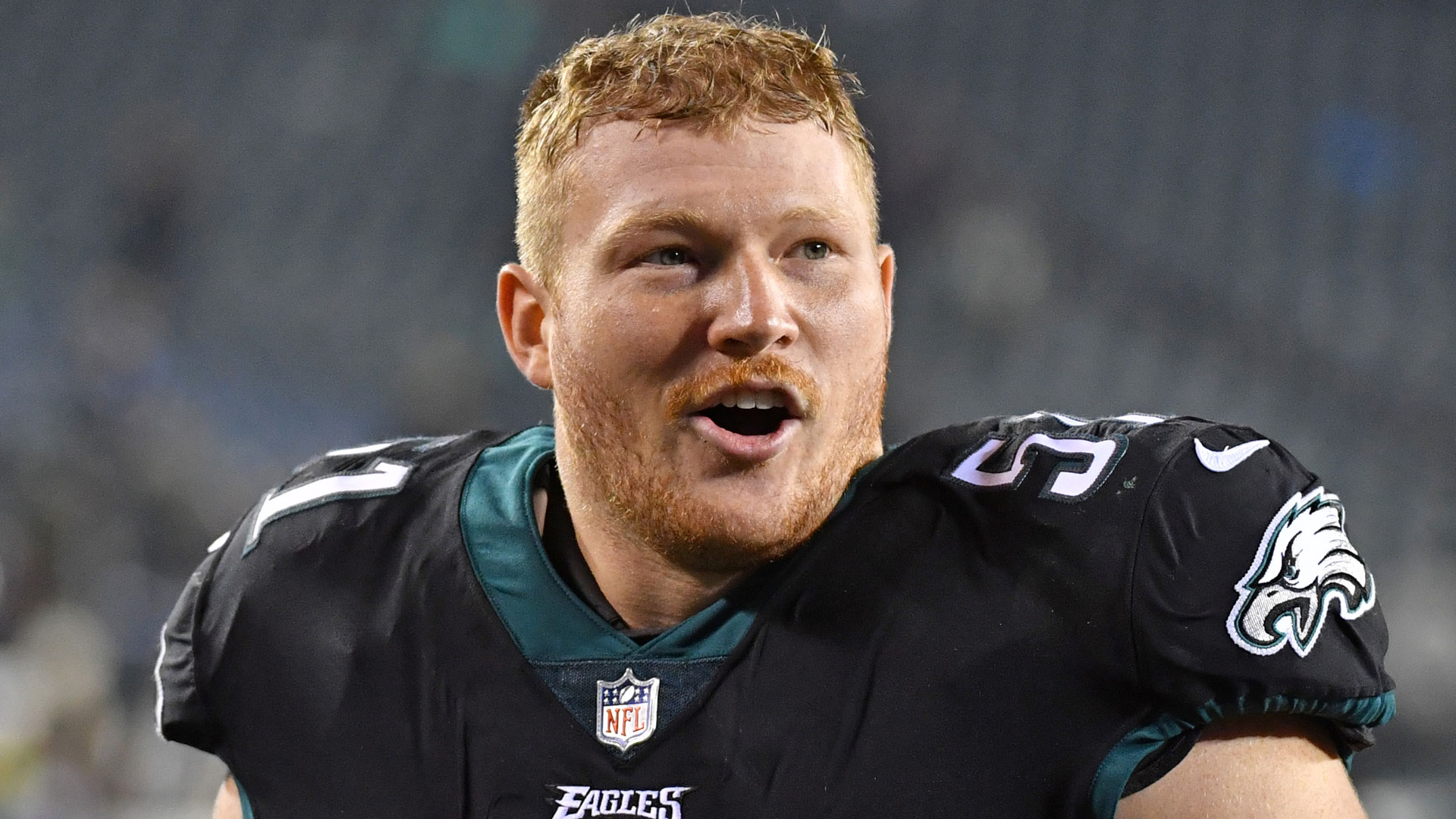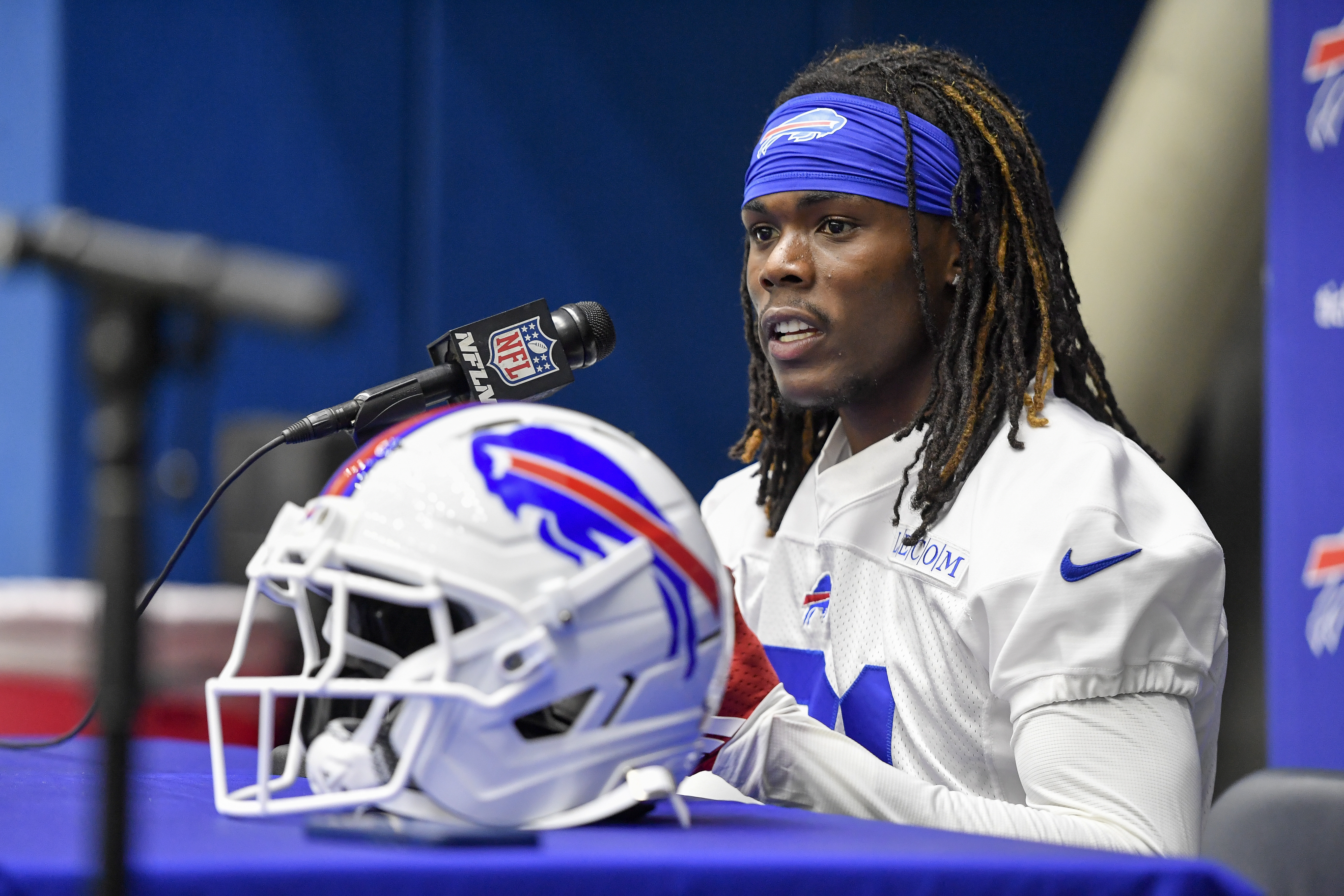The Eagles are only the seventh team since 1960 – and the first since 2000 – to head into a draft with three top-20 picks.
This is a once-in-a-generation opportunity for the Eagles to replenish their roster with elite young talent.
The Eagles have never had three 1st-round picks in the top 20.
With our All Access Daily newsletter, stay in the game with the latest updates on your beloved Philadelphia sports teams!
Heck, they haven’t even had two top-20 picks in the same draft since 1973, when they selected offensive tackle Jerry Sisemore at No. 3 and tight end Charle Young at No. 6. Both became multiple Pro Bowlers for the Eagles.
And while there is a chance the Eagles won’t still be sitting at No. 15, 16 and 19 by the time April 28 rolls around, if they do indeed pick three of the first 19 players it will equal the number of top-19 picks they’ve had in the last eight drafts combined.
The good news: Three of the six teams that have had three top-20 picks since 1960 drafted at least one Hall of Famer. One drafted two. All six drafted at least one Pro Bowler. Three drafted two. And two went 3-for-3.
The bad news: Only one of the six teams won a Super Bowl or NFL Championship during the 10 years after taking three top-20 players, although two others reached a Super Bowl.
NFL
So with a unique opportunity facing Howie Roseman and the Eagles’ scouting staff in four weeks, we thought we’d take a look back at the six previous teams since 1960 that have had three top-20 picks in the first round and how those drafts impacted each franchise in the ensuing years.
2000 Jets
#12 DE Shaun Ellis [B+]: Had a very long, productive career, 10 years as a starter with the Jets, made Pro Bowls after the 2003 and 2009 seasons, had 72 ½ sacks as a Jet, 2nd-most in franchise history and only 1 ½ behind Mark Gastineau’s 74. Played 3rd-most games by a defensive player in Jets history (behind only Kyle Clifton and Mo Lewis).
#13 DE John Abraham [A-]: Made three Pro Bowls in six seasons with the Jets and ranks 3rd in franchise history in sacks, behind Gastineau and Ellis. Was a 1st-team all-pro in 2001 when he had 13 sacks. Played nine years with Cards and Falcons after leaving Jets. Ranks 13th in NFL history with 133 ½ sacks.
#18 QB Chad Pennington [C]: Had a few decent years and led Jets to playoffs in 2002, 2004 and 2006. Led NFL in completion percentage and passer rating in 2002 and ranks 5th in NFL history in accuracy (behind Drew Brees, Kirk Cousins, Dak Prescott and Patrick Mahomes). But ultimately went just 32-29 in eight years with Jets and never became a franchise QB.
Long-term impact: The Jets landed two Pro Bowl players and a playoff quarterback in the first round in 2000, and they did reach the playoffs four of the next seven years, but they only won one playoff game during the six years Ellis, Abraham and Pennington were together. They did reach the AFC Championship Game in 2009, but by then Pennington and Abraham were gone, although Ellis was still playing at a Pro Bowl level.
Overall Grade: B-minus
READ: Why does Lurie keep giving Howie Roseman new contracts?
1991 Cowboys
#1 DT Russell Maryland [B-]: Only spent five years in Dallas before finishing his career with the Raiders and Packers. Was a very good starter on some terrific defenses. Made only Pro Bowl in 1993. Had 14 ½ sacks in five years for Cowboys and was a force on the interior of those Dallas defensive fronts. You expect more from an overall No. 1 pick, but Maryland was a solid player.
#12 WR Alvin Harper [C]: Although he did lead the NFL in yards per catch in 1994, overall Harper had a disappointing four years in Dallas, with just 124 catches for 2,486 yards and 18 TDs. Never had more than 36 catches or 821 yards as a Cowboy and was never a full-time starter after his 27th birthday. Did put up big postseason numbers and had 75 yards in the Super Bowl XXVIII win over the Bills in Atlanta.
#20 DL Kelvin Pritchett [D-]: The Cowboys traded Pritchett to the Lions in exchange for three picks that landed them Dixon Edwards, James Richards and Tony Hill (not that one). Edwards was an OK starter for a few years, but Richards didn’t make it out of his rookie training camp and Hill never started a game in his brief 13-game career. Pritchett had a long but fairly nondescript career with the Lions and Jaguars, but the D- grade is for turning the 20th pick overall into one average player and two guys who gave the Cowboys nothing.
Long-term impact: The Cowboys did win three Super Bowls in the next five years, but Maryland was the only player involved with all three. Harper was on the first two Super Bowl teams and played well in those postseasons, and that brings the overall grade up a bit. But overall the Cowboys did not gain the talent you would expect going into a draft with the 1st, 12th and 20th picks.
Overall grade: C+.
1975 Rams
#9 DL Mike Fanning [C]: Spent eight years with the Rams but was only a full-time starter two of those seasons. Did have an unofficial 10 sacks in 1980 but overall was not a huge impact player as a top-10 pick.
#11 G Dennis Harrah [A]: Harrah, on the other hand, was a six-time Pro Bowl right guard and made an all-pro team in a 13-year career with the Rams. From 1975 through 1987, the only guard to make more Pro Bowl teams was John Hannah.
#20 OT Doug France [B]: Weird career. France made two Pro Bowls in seven years with the Rams, then retired at the age of 28. After a year out of football he played one more year with the Oilers before retiring again. But for a short stretch in the late 1970s he was one of the better left tackles in football.
Long-term impact: The Rams were already a perennial playoff team before 1975, but Harrah and France and Fanning to a lesser extent were staples on a team that went 64-25 from 1975 through 1980, reaching the playoffs each year, including three NFC Championship Games and one Super Bowl.
Overall grade: B+.
1973 Patriots
#4 G John Hannah [A+]: Hannah spent his entire 13-year career with the Patriots, making nine Pro Bowls and six all-pro 1st teams. He was inducted into the Hall of Fame in 1991.
#11 Sam Cunningham [C+]: Sam “Bam,” Randall’s older brother, had a good career but not what you’d want from the 11th pick. He rushed for 5,453 yards and 43 TDs in nine seasons with the Patriots and did make a Pro Bowl but only had a career average of 3.9 and only finished in the top 10 in the NFL in rushing yards twice (8thin 1976, 10th in 1978).
#19 Darryl Stingley [D]: Tragic story. Stingley’s career ended after just five years when he was paralyzed by a hit from Jack Tatum of the Raiders, and he passed away in 2007 at just 55. Evaluating his first five years, Stingley only had 110 catches for 1,883 yards and 14 touchdowns, although his final season was his best season. But removing the injury from the equation, it was a disappointing pick. His grandson, Derek Stingley Jr., played at LSU and is expected to be one of the top corners taken in this year’s draft.
Long-term impact: The Patriots never really built on the 1973 draft. They didn’t win a playoff game for another 12 years, which was Hannah’s final season. Anytime you draft a Hall of Famer it’s a successful draft, and Cunningham was a decent running back for most of the 1970s, but having three top-20 picks certainly didn’t have a significant long-term impact on the franchise.
Overall grade: B-.
1965 Bears
#3 LB Dick Butkus [A+]: One of the greatest linebackers in history. Five-time 1st-team all-pro and eight-time Pro Bowler in nine-year career. Inducted into the Hall of Fame in 1979 in his first year of eligibility.
#4 RB Gale Sayers [A+]: One of the greatest running backs in history in a short career. Played more than two games only five times but led NFL in rushing twice, in yards per game three times, in yards per carry once and was top-5 in MVP voting all five years. Also led the NFL in kick return average twice and had eight return TDs on just 118 career returns. His 30.6 career kick return average is an NFL record. Inducted into the Hall of Fame in 1977 in first year of eligibility.
#6 DE Steve DeLong [B-]: DeLong was also drafted by the AFL Chargers and signed with San Diego, where he spent seven years before finishing his career with one season with the Bears. Made a Pro Bowl in 1969 when he had a league-high 15 ½ unofficial sacks. A solid starter for eight years. Just not with the Bears.
Long-term impact: Interesting that the Bears drafted two 1st-ballot Hall of Famers just two years after they won their ninth NFL Championship, but even with Butkus and Sayers they never became an elite team. During the seven years the Bears had both Sayers and Butkus they went 41-54-3, and in the nine years Butkus was in Chicago they went 48-74-4 and never reached the postseason. Neither Sayers or Butkus ever played in the postseason. Neither did DeLong, for that matter. Incredible draft but it didn’t lead anywhere.
Overall grade: A+.
Subscribe to the Eagle Eye podcast
Apple Podcasts | Google Play | Spotify | Stitcher | Art19 | Watch on YouTube
1961 49ers
#6 CB Jimmy Johnson [A+]: Johnson spent his entire 16-year career with the 49ers, making five Pro Bowls and two 1st-team all-pro teams. He had 47 interceptions and two pick-6’s and was inducted into the Hall of Fame in 1994.
#9 WR Bernie Casey [B]: A solid receiver in six seasons with the 49ers before finishing his career with the Rams, where he made his only Pro Bowl. From 1962 through 1966 he ranked 9th in the NFL in catches and 12th in yards.
#11 QB Billy Kilmer [D-]: Lasted 18 years in the NFL but only five in San Francisco, where he backed up John Brodie most of the time and started only one game (he threw three interceptions). Kilmer eventually had a couple good years with Washington – he led the NFL with 19 touchdown passes in 1972, his only Pro Bowl season, and took Washington to the playoffs five times in the 1970s (going 2-5).
Long-term impact: The 49ers went 50-69 over the next nine seasons before finally reaching the playoffs in 1969 for the first time since 1957. Johnson was the highlight of the draft but in his 16 seasons the 49ers only won two playoff games.
Overall grade: B.


